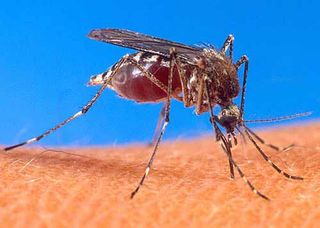Mosquitoes Harmonize to Find a Mate

The annoying buzz of a mosquito means a lot more to the bugs than you might imagine.
Mosquitoes rely on harmonizing the "songs" produced by their wing beats to find an appropriate mate — most importantly one of the same species and, of course, the opposite sex.
"Everyone must be familiar with the maddening whine a mosquito makes as it hones in for a bite," said Gabriella Gibson of the University of Greenwich at Medway. "Many of us have wondered why it makes its presence so obvious — surely, after all of these centuries of blood-feeding, selection should have favored a more stealthy approach that would leave mosquitoes less vulnerable to the defensive attacks of its unsettled host."
Mating trumps all other desires, Gibson and colleagues found.
"Our findings suggest that mosquitoes rely on the sounds they make to attract a mate of the right species, a behavior that is far more vulnerable to selection than avoiding the risk of being squashed by the rare host that is still awake at feeding time."
As early as 2006, researchers know that mosquitoes used their annoying whine to find each other and mate. And a study several months ago discovered that at least one species of mosquitoes uses harmony to find, well, harmony.
The new study reveals just how widespread and effective the practice is.
Sign up for the Live Science daily newsletter now
Get the world’s most fascinating discoveries delivered straight to your inbox.
There are seven species of the Anopheles gambiae mosquitoes, together responsible for the vast majority of malaria deaths. The new results help to explain how these different bugs reproductively isolate themselves and maintain their genetic diversity, even while some travel in the same swarms.
The newly discovered harmonizing is analogous to two partially deaf singers — one alto and the other soprano — who can hear low frequencies, but perhaps not their own or each other's songs, Gibson explained. Instead, they listen to the terrible dissonance if one or the other goes a bit sharp or flat, which they can get rid of by adjusting their respective tones until the dissonance diminishes to nothing.
"They can do this even if they each sing a different note, say a 'middle C' and a 'G' four tones higher," explained co-researcher Ian Russell of the University of Sussex. "By listening and subtly altering their pitch to minimize the dissonance, they achieve their goal of 'singing' in a perfect harmony that we, but not they, can hear."
The researchers have now shown that two mosquitoes don't harmonize successfully if they are of the same sex or if they are not the same type of mosquito. They might try for a while, Gibson explained, but they never find that harmony and eventually give up trying.
"Even the most 'lowly creatures,' such as mosquitoes, have highly evolved neurosensory systems that can process relatively simple auditory inputs to produce motor outputs enabling them to distinguish between other types of mosquito that are so closely related we need to analyze their DNA to tell them apart," Gibson said.
The findings are detailed online Dec. 31 in the journal Current Biology.
- Amazing Animal Abilities
- 10 Amazing Things Things You Did'nt Know About Animals
- Gallery: Backyard Bugs

